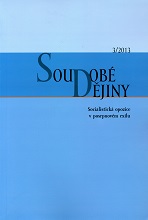Vědecké revoluce a politické postoje
Scientific Revolutions and Political Attitudes
Author(s): Jan MervartSubject(s): History
Published by: AV ČR - Akademie věd České republiky - Ústav pro soudobé dějiny
Summary/Abstract: The author discusses Vítězslav Sommer’s Angažované dějepisectví: Stranická historiografie mezi stalinismem a reformním komunismem (1950–1970) (Engagé history writing: Party historiography between Stalinism and Reform Communism, 1950–70) (Prague: Nakladatelství Lidové noviny and Filozofická fakulta Univerzity Karlovy, 2011). He mainly appreciates the fact that Sommer’s monograph takes so-called ‘Party historiography’ seriously rather than as a mere instrument of politics or propaganda. Thanks to that, it can legitimately be read at least on two levels: as the study of an important segment of Czech post-war historiography extending also into the history of other fields of the humanities in the Stalinist and post-Stalinist periods and also as the story of Communist intellectuals’ gradually involvement in the formation of the socialist dictatorship, its limited criticism, and the attempt at its reform. In his overall very positive assessment, the reviewer also expresses doubts whether the gradual emancipation of Czech historiography from Stalinist dogma can really be ascribed to the change in scientific paradigms, as Sommer interprets it in connection with Thomas Kuhn’s conception, or whether it resulted from a change in the political attitudes of historians. The reviewer claims that Communist historians at the start of de-Stalinization were on the whole much more conformist than, for example, philosophers or writers, and he puts forth the hypothesis that this reflects their stronger affiliation with the structures of the Party apparat.
Journal: Soudobé Dějiny
- Issue Year: XX/2013
- Issue No: 03
- Page Range: 406-410
- Page Count: 5
- Language: Czech

